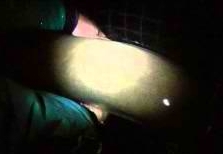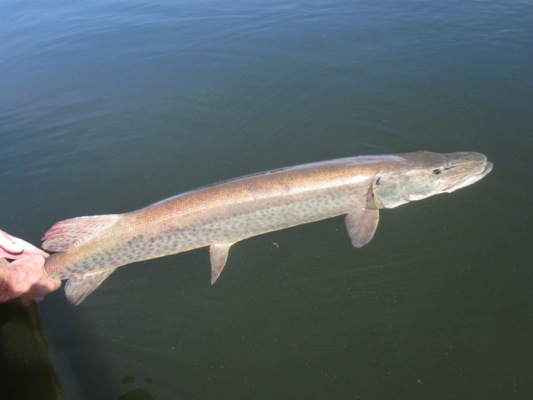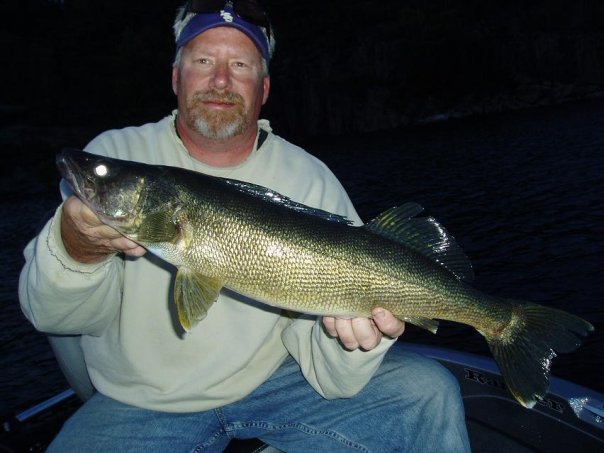|
|
| We’ve all heard that the fish get active when the barometer drops. Why?? Here’s my theory: You know how when you open a beer can it bubbles? Using that train of thought: when the atmospheric pressure drops the oxygen in the water “bubbles” giving the fish a better use of the oxygen to go chase some food.
If that ain’t it let me know.
| |
| | |
| Hmmm… No takers huh…I guess I’ll have to get one of those fancy DO meters and reword the post to make it sound more “researchish” to get some believers, but until then, be prepared to hear in my boat: “I can tell by the way the beer tastes the fish are about to turn on” | |
| | |
| NXT,
I know guys that will smell the weeds to determine if they are "productive" or not. I wonder what the weeds smelled like that Larry Ramsell referred to in a different post..... looked great, but how did they smell?
Can you smell OXYGEN???? Or in your case.... taste it??? | |
| | |
| Yes, the beer tastes more “effervescent” when the pressure is dropping. If the beer tastes flat the fishing probably isn’t that good. You need much practice to determine these observations. And yes, other than the visual references, good weeds will smell better-fresher than older weeds. Sometimes, when you find the newest growth of the season, they get kind of a “skunkish” smell to them. You know then that you’ve found a good spot.
So, I guess to prove my theory correct I need to know two things: 1) Does the oxygen level increase, or does oxygen get released into the water from weeds, mud, etc., when the barometer drops? 2) Does a sudden increase in the oxygen level cause muskies to get active?
Doesn’t seem too hard to accomplish.
Follow up thought, would a high-pressure system “push” the smaller sized oxygen molecules back into the water?
| |
| | |
| NXT,
As the oxygen content increases, the muskies metabolism increases. Thus, more oxygen in the water would mean the muskie CAN feed more often. That means more hungry muskies.... the kind we all want to find.
The question is, does barometric pressure influence dissolved oxygen content in the water? Temperature and Pressure affect the vapor pressure of a liquid... so if we refer to the Clausius-Clapeyron Equation..... toss in Raoult's and Henry's laws.... (holy crap, I'm scaring myself here)
The answer is yes, oxygen content may be influenced by atmospheric pressure... but the REAL question is whether the change is significant enough to have an affect on musky behavior (metabolism). I would guess probably not, and that temperature would have a greater affect.
Any college students out there that still know how to use all these friggen equations?? Can you calculate the difference in oxygen content (PPM) of water at 70 deg. F and a few levels (high and low) atmospheric pressure? Is it significant? Also, how significant is the affect of temperature? What is the difference in DO for water at 40 and 80F? Too complicated for me..... | |
| | |
| I’m not sure what you’re talking about or where the confusion was. These were growing in water. | |
| | |
| NXT,
Without going to my text books, like Jlong did. If he came up with the Clausius-Clapeyron Equation, and Raoult’s and Henry’s Law with out looking it up he is a bigger geek than I thought. He best not admit it, heck I feel like a dork just for recognizing them.
Any way you have a very interesting theory, but I don’t think it is a factor. I believe you stated it correctly, as pressure drops, Oxygen will be released from the water. But that would be a bad thing for the fish, they need the oxygen dissolved in the water to be useful to them. Every thing I have seen and read, higher dissolved oxygen content means more active fish.
From memory:
Higher Temp= Lower Dissolved Gasses (This is why water boils)
Lower Pressure = Lower Dissolved Gasses (This is why a scuba diver gets the bends)
Lower Temp = Higher Dissolved Gasses
Higher Pressure = Higher Dissolved Gasses (Why your beer is carbonated, CO is release when pressure drops, can is opened)
As far as how much pressure fluctuation is needed to effect dissolved oxygen in water, I have no idea. But it does depend on the gas properties.
Nail A Pig!
Mike | |
| | |
| Jason: They smelled fine and also tasted good (the "taste test" is the only sure way to know!-beware of "beaver fever" though if you choose to eat them).
Muskie regards,
Larry Ramsell
www.larryramsell.com | |
| | |
| Thanks, Larry, for clarifying that about your sterile weedbed. There must be a different explanation then. Beaver Fever?????????? I know I had that as a teenager (ha ha).
MRoberts, glad to see you finally participate on this board. Your photographic memory is awesome and I look forward to you sharing some of your observations as a musky nut. I'll ignore the fact that you almost called me a geek and say thank you for the simple breakdown of how pressure and temperature affects the vapor pressure of a liquid. Also, since you reinstated your "shotgun a beer" after every musky release superstition last year, did you notice if the beer had more or less effervescence than usual? Figured you had first hand observations you could use to try and give NXTWRLDRCD an answer to his original question. Looks like you will have to continue this RESEARCH project more in 2002! | |
| | |
| I can you this much, oxygen turns the fish on. For several years I did seminars on the hawg tank at spot shows. it was however just bass in it. Befor a seminar if we pumped oxygen into the water the fish were very aggresive. We tried it times without doing it and the fish were not nearly as aggressive. I for sure believe that it makes a difference.
Don Pfeiffer | |
| | |
| It would seem wind and lowering temperature have more dramatic effect on dissolved oxygen content than barometric pressure. The wind creating turbulance to mix oxygen into the water as the lowering temperature increases the DO capacity of the water, i.e., colder water can hold more dissolved oxygen than warmer water. Does this mean the cold front w/ stiff winds will turn on the muskies?[:0]
Al Warner
www.casslakewasablastthankstoMuskieFIRST.com | |
| | |
| One thought-
If the O2 level drives the fish activity during frontal conditions then in my mind high pressure days would be the best. However, a lot of folks would conclude the approach of a low front gets the fish into high gear...low pressure =less dissolved O2 as stated above (for discussion purposes).
I do believe O2 levels affect fish activity. BUT, I think at more of the extreme cases and not the slight fluctuations caused by barometric pressure changes.
ALSO, if fish are like humans, we have a saturation point, we can only absorb so much O2 no matter how much you pump into your lungs. Not sure what that point is in fish, not a fisheries person. So assume they saturate in 65F water that is properly oxyegenated, pressure goes up (barometer) and O2 goes up but big deal the fish have all they need....Need someone who know something, not just us fringe scientists!
Good discussion thought!
Cory | |
| | |
| I reckon fish can feel drop/rise of the air pressure? We all know what changes to weather conditions it brings, so does the fish. Maybe it is a trigger reflex - falling barometer brings very favourable hunting conditions. Hence, a fish goes on a feeding spree using such opportunity. Not only with post front blue skies it is harder to hunt but also there is no need, a fish is full. It will take some time to warm the appetite again.
Re: oxygen dissolving.
I have a 125gal tank. I panicked when my air compressor broke down. I do not have any live plants and my only other thing that left operative was a water filter, where water intake and discharge is submersible.
I thought my fish will eventually suffocate due to the lack of oxygen. Well, they didn't. Two months later and I still do not notice any changes in behaviour.
MS
[8)] | |
| | |
| I'm no scientist, but I do know this! Cory Painter mentioned the "saturation point", and the "barometer" told me I'd reached that point when the beer cans were knee deep in the bottom of the boat, and I had to throw out the anchor and spin for a couple hours...all the info. is right...the bubbling, the gasses, the pressure...probably why I no longer drink, the "barometer" kept RISING....[:knockout:]
| |
| | |

| Ahhhh the good’ol days…  | |
| | |

Posts: 1906
Location: Oconto Falls, WI | Don't see much like this anymore over here Mike. | |
| | |

Posts: 1939
Location: Black Creek, WI | CiscoKid - 1/13/2011 11:14 AM
Don't see much like this anymore over here Mike.
Why Not??? | |
| | |

Posts: 8863
| jlong - 1/19/2011 1:30 PM
CiscoKid - 1/13/2011 11:14 AM
Don't see much like this anymore over here Mike.
Why Not???
Hehehe. Huh. 
When you start talking about the seiche effect, perkinje shift, toilet bowl theory and things of that nature, you're going to lose a lot of people. Part if it is that there are a lot of people here in the what/rod/reel/lure should I buy phase, and quite a few others who just don't care about the how and why of what makes muskies (and other fish) do what they do.
There are also those who think they already know everything there is to know about musky fishing. They aren't much fun when you start taking about science! 
Edited by esoxaddict 1/21/2011 9:12 PM
| |
| | |

Posts: 1906
Location: Oconto Falls, WI | esoxaddict - 1/19/2011 9:24 PM
jlong - 1/19/2011 1:30 PM
CiscoKid - 1/13/2011 11:14 AM
Don't see much like this anymore over here Mike.
Why Not???
Hehehe. Huh. 
When you start talking about the seiche effect, perkinje shift, toilet bowl theory and things of that nature, you're going to lose a lot of people. Part if it is that there are a lot of people here in the what/rod/reel/lure should I buy phase, and quite a few others who just don't care about the how and why of what makes muskies (and other fish ) do what they do.
There are also those who think they already know everything there is to know about musky fishing. They aren't much fun when you start taking about science! ;- )
Exactly EA!
| |
| | |

Posts: 32954
Location: Rhinelander, Wisconsin | I know nothing....nooooothing...!
Pretty quiet on the Research Board since the controversies died off a couple years back. | |
| | |

Posts: 8863
| I've only paid passing attention to barometer readings, and it's been after days of abnormal fish activity. What I've noticed is that extreme drops in barometric pressure seem to indicate good fish activity. Makes sense, as fronts usually accompany low pressure systems. But I've also encountered days where there was no frontal activity that I knew of, and fish seemed to be everywhere. Haven't studied this enough or related my own experiences to it enough to make any assumptions I'd hang my hat on, but it seems like when the barometer is moving, so are the fish.
Someone told me once that you can tell when the pressure is dropping when your tail prop baits leave bubbles standing on the water. Sounded like crap at the time, but the times I've noticed that have also been times where we've seen and caught a lot of fish. | |
| | |

Posts: 13688
Location: minocqua, wi. | after reading about all of the changes above and trying to understand the science behind it, have you ever considered that maybe it's just whatever the fluctuate? | |
| | |

Posts: 8863
| I thought of that Jon. But then the only thing that seems to move when it comes to those sort of fluctuations is my girlfriend. Usually to another room... | |
| | |
Posts: 59
Location: Chicago western burbs | Interesting post. Here is my thoughts based upon what you guys have presented.
Low front approaches, and changes barometric pressure. Musky, through millions of years of conditioning, determines that in the coming near future less oxygen will be available to them and thus goes on the hunt for food. They become active, eat, and wait out the change in pressure. Remember that being active creates lactic acid in the muskies muscle. Lactic acid is removed through oxygenation. A great deal of l.a. without the ability to remove it in a timely manne could theoretically cause a musky to die. Thus the musky has been conditioned to become active and eat while they still have the opportunity to burn off the lactic acid through oxygenation.
Any thoughts? | |
| | |

Posts: 8863
| That makes sense, but I wonder if it's simpler than that. Big drops in barometric pressure usually signal the approach of a storm, right? During that storm you have dark skies, lightning, high winds, heavy rain, etc. Those factors combined probably scatter the baitfish and/or drive them into heavy cover, and also make feeding much more difficult as the visual and lateral line cues are disrupted. Before and after can be good, but I have NEVER had luck fishing in a heavy downpour. Maybe the rain hitting the surface creates too much of a disturbance? I agree about conditioning, but I think it's just a matter "eat now or wait until it's all over"... That would also explain some of why post frontal bluebird days are typically not great fishing - most of the fish have already eaten. Whatever the reason, I've had the best luck with all species of fish during the times where the weather is changing, whether it's a change in wind directionm wind speed, clouds rolling in on a sunny day, or even when the sun comes out or the wind lays down. Never really put much thought into what was going on environmentally until recently, but it seems pretty consistent that if nothing is happening out there now, it well be when the weather changes.
Had a few times over the years when the fish would just start eating for no apparent reason, and then half an hour later you'd hear that thunder off in the distance.
Cool topic. Doesn't change my fishing any, but it's fun to talk about! | |
| | |
Location: Green Bay, WI | Since water pressure changes with increasing depth, I cannot see how changes in atmospheric pressure would ever be all that significant--except maybe right at the air/water interface (ie; the surface). At about 33 feet, pressure is doubled, compared with the surface. I do seem to recall that there is more pressure change in the first several feet of depth, however the absolute water pressure acting to keep gases dissolved is probably much higher than atmospheric pressure within only a feet of of the water surface. So while I cannot demonstrate the difference mathematically right here and now, I have serious doubts that a change in barometric pressure of even an inch would be enough (or occur fast enough) for there to be any significant effervescence of dissolved gas.
Also, we shouldn't forget a couple of other things... First, since oxygen is only a minor (about 21%) component of air, not all of the gas effervesced would be oxygen. But more importantly, fish have gills. Gills are well-suited to extract dissolved gases from water flowing across them...not from gas bubbles in the water. It's been a while since I had fish physiology, but I seem to recall that most fish cannot breath air. Some are certainly facultative air breathers, but I don't believe that muskellunge are. Thus they pretty much have to get their oxygen dissolved in the water. So I doubt that any extra gas bubbles in the water would make any difference whatsoever, as it would come from gas that had been dissolved. So unless I am mistaken, the dissolved gas would probably *decrease* in such a case.
I don't really have a definitive explanation as to why fish are more active when the barometer changes, but I can't see how it would be related to the liberation of dissolved gas. I can certainly see how this would be the case in windy conditions, when there is an increased surface area for gases to be dissolved into the water. Thus it may simply be an issue of the changes of wind speed and wave action associated with the weather systems causing these barometric pressure changes.
Interesting topic though!
TB | |
| | |

Posts: 1906
Location: Oconto Falls, WI | In a discussion on another board the topic of barometer readings a fish activity came up. Here are some of my responses to the discussion so keep in mind there may be missing info that others said. The discussion started out talking about majors and minors.
Some quick stats on a day that was pretty good:
The following information is provided for Eagle River, Vilas County, Wisconsin (longitude W89.2, latitude N45.9):
Thursday
15 June 2006 Central Daylight Time
SUN
Begin civil twilight 4:27 a.m.
Sunrise 5:06 a.m.
Sun transit 12:57 p.m.
Sunset 8:49 p.m.
End civil twilight 9:28 p.m.
MOON
Moonrise 11:53 p.m. on preceding day
Moon transit 4:24 a.m.
Moonset 9:06 a.m.
Moonrise 12:20 a.m. on following day
Phase of the Moon on 15 June: waning gibbous with 81% of the Moon's visible disk illuminated.
Last quarter Moon on 18 June 2006 at 9:08 a.m. Central Daylight Time.
Fish caught:
5:50am-39
6:30am-38.5
11:50am-41
2:00pm-41
4:50pm-46
5:30pm-44
6:00pm-43.5
9:50pm-41
Not one fish caught close to a peak time from what I can tell. In close I mean within 10 min.
I'd be interested in seeing what the barometer was doing that day. I'll check it out when I get a chance.
So looking at my lat post does the "peak" time mean anything for smaller fish, or does it only come in to play for lets say fish over 50"? I checked a couple other of my "good" days, and my results are similar to above.
What is interesting about the above day is the following day the conditions were identical. Same body of water. Only ended up catching 1 fish at 10:30 am.
Another note is a lot of my experience comes suspended fishing as most of you are aware. So I pose the questions does the moon/"peak"times play a major factor more in "structure" fish than their suspended cousins? From everything I have experienced while fishing suspended/deep is the fish are a lot less affected by weather. I also don't see a dramatic increase of activity around the majors/minors.
Should I pay attention to the majors/minors while fishing suspended, and when they are nearing head to the nearest best structure area to catch a 50"+ fish?
So the jist of it that I am getting from Brad and Mike is that the major/minor may be key on contacting the largest fish of the day. I am not buying into it yet as I see it as a SFP. If I am always hitting big fish spots at "prime" of course on occasion I will boat a lunker. But reason tells me I can hit big fish spots all day, outside of the "prime" time, and still have as much of a chance at a lunker hitting. I may just have to push the "aggression" button rather than the "feeding" button.
Believe me guys there are days I think the set/rise/underffot/overhead was THE ticket to boating a fish. However, those days are a lot fewer than the days of catching fish outside of the windows.
I took a look at the Barometer data for the day I had above. What I find interesting is this. The Barometer was pretty much a steady fall all day. Good reason for the great day. What is more interesting is most of the fish caught were during a steady barometer. Looking at the graph almost every fish fell into the time where the barometer trend line was horizontal in between either a falling trend or a rising trend.
Edited by CiscoKid 4/21/2011 12:15 PM
(Barometer-June15-2006.jpg)
Attachments
----------------
 Barometer-June15-2006.jpg (102KB - 340 downloads) Barometer-June15-2006.jpg (102KB - 340 downloads)
| |
| |
|
 Beer can barometers
Beer can barometers Beer can barometers
Beer can barometers